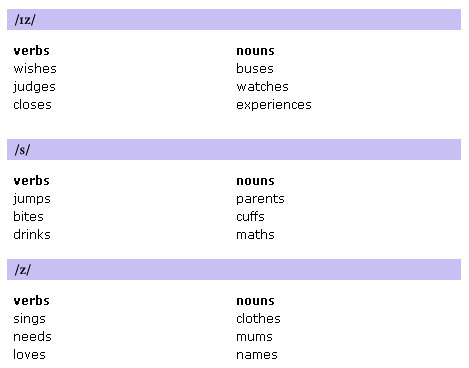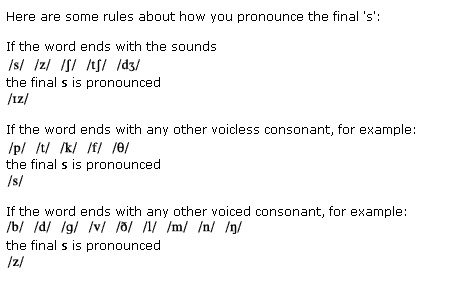-
(单词翻译:双击或拖选)
本单元是关于Tim 爱的忠告的对话
Michal: Tim, can I talk to you?
Tim: Sure, what's on your mind?
Michal: It's about Helen and her family.
Tim: Yeah, how was that visit you had to her folks' place?
Michal: It was difficult.
Tim: Why?
Michal: Well, I thought Helen and I were just having some fun, you know, nothing too serious. But her parents have already got us married and are right now thinking up names for the grandchildren we're going to give them!
Tim: Does Helen feel the same as you then?
Michal: I'm not sure.
Tim: Well, you need to find out and then you've got to set her parents straight ... I wonder who that is.
Vocabulary:(字汇)
folks (plural1 only, informal):(家人,只能用复数,非正式)
family or parents
place (informal):(家,住所,非正式)
house or flat
本单元的语言点是关于 s 的发音,一般复数名词 (e.g. names, parents) 和第三人称现在简单式动词 (e.g. she sings, he learns, it runs) 都必须在字尾加上 's' ,但是字尾的S有 三种不同的发音方式。
Pronouncing 's'
Regular plural nouns (e.g. names, parents) and 3rd person present simple verbs (e.g. she sings, he learns, it runs) all end in 's' but there are three different ways of pronouncing this letter.
一般复数名词 (e.g. names, parents) 和第三人称现在简单式动词 (e.g. she sings, he learns, it runs) 都必须在字尾加上 's' ,但是字尾的S有 三种不同的发音方式.
Voiced and unvoiced sounds 发音和不发音
If a sound is voiced it means that there is a vibration2 in your throat when you say the sound. If place your hand over your throat and say the sound /z/ or /m/, for example, you can feel your throat vibrate or buzz. When you say an unvoiced sound, on the other hand, like /s/ or /t/, you can't feel any buzz or vibration in your throat.
's'发音的规则 
 收听单词发音
收听单词发音
1
plural

|
|
| n.复数;复数形式;adj.复数的 | |
参考例句: |
|
|
|
2
vibration

|
|
| n.颤动,振动;摆动 | |
参考例句: |
|
|
|

















